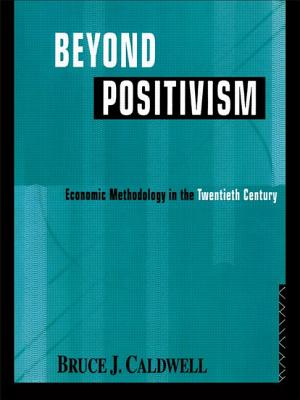

 Routledge
Routledge
Beyond Positivism


Key Metrics
- Bruce Caldwell
- Routledge
- Paperback
- 9780415109116
- 8.5 X 5.51 X 0.67 inches
- 0.84 pounds
- Business & Economics > Economics - Theory
- English
 Secure Transaction
Secure TransactionBook Description
Since its publication in 1982, Beyond Positivism has become established as one of the definitive statements on economic methodology. The book's rejection of positivism and its advocacy of pluralism were to have a profound influence in the flowering of work methodology that has taken place in economics in the decade since its publication. This edition contains a new preface outlining the major developments in the area since the book's first appearance.
The book provides the first comprehensive treatment of twentieth century philosophy of science which emphasizes the issues relevant to economics. It proceeds to demonstrate this relevance by reviewing some of the key debates in the area. Having concluded that positivism has to be rejected, the author examines possible alternative bases for economic methodology. Arguing that there is no best method, he advocates methodological pluralism.
Author Bio
Professor Caldwell's research focuses on the history of economic thought, with a specific interest in the life and works of the Nobel Laureate economist and social theorist F. A. Hayek.
He is the author of Hayek's Challenge: An Intellectual Biography of F. A. Hayek (2004) and since 2002 has served as the general editor of the book series The Collected Works of F.A. Hayek . The first volume with co-author Hansjoerg Klausinger of his full biography of Hayek is expected in 2021.
In 2019-2020 he was a Distinguished Visiting Fellow at the Hoover Institution at Stanford University. He has held research fellowships at NYU, the LSE, and Cambridge University. At Duke he is the Director of the Center for the History of Political Economy, a center whose purpose is to promote research in, and the teaching of, the history of economic thought.
The Center has received grants from a variety of sources, among them the National Endowment for the Humanities (2010, 2013, 2016), the John W. Pope Foundation (2008-present), the Institute for New Economic Thinking (2011-2013), the Thomas W. Smith Foundation (2011-17), and the Charles Koch Foundation (2018-present).
Source: Duke University
Videos
No Videos
Community reviews
Write a ReviewNo Community reviews